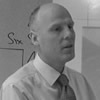
 Robin Nicolson - School teacher
Robin Nicolson - School teacher
I worked, mainly in manufacturing and industry, for 15 years before entering teaching, so my route to this profession has been varied and interesting.
Whilst studying for a degree in Mathematics, I worked in the General Register Office in Scotland, assisting with a census test. On graduating, I worked in a paper mill where I introduced statistical quality improvement methods. For example, I was responsible for producing six tonnes of paper as a statistically designed experiment and I generated an improved watermark and speedier production, increasing quality and profit for the business….all down to the power of statistical analysis and good consultancy skills.
I then worked in the pharmaceutical sector. Firstly at Pfizer Central Research as part of a small team of statisticians supporting pharmacologists. This was the early stages of clinical research for new human medicines and designing experiments for the laboratory was a vital part of this process and accurate data analysis and interpretation techniques were essential. I had to learn pharmacological ‘processes’ so that I could better understand cardio-vascular terminology etc. During my time at Pfizer I began to work with (and enjoy working with) school groups as they would come to the site to experience how they could use their favourite subject in a career.
Later at GSK’s manufacturing facility, I generated controlled changes to processes, based on statistical analysis, improving processes. I managed a team of statisticians which supported different sites and facilities. I often played a lynchpin role when factories could not resolve quality issues, by collecting and analysing data from the facilities involved and presenting results for a speedy resolution. At around this time, GSK worldwide manufacturing began to use ‘Lean Sigma’ to drive performance improvements. This initiative gave statisticians a higher profile in the organisation and I set-up a statistics team which produced asthma inhalers and tablets. I then moved to the ‘Lean Sigma’ team where I trained colleagues and was heavily involved in business improvement initiatives. It is very satisfying to watch as production line machine settings are changed and the process operates normally but with better outputs!.
I spent a year within HJ Heinz in the purchasing department where I ensurd that Heinz’s agricultural suppliers were continually improving the materials they supplied. Using modern ‘Lean Sigma’ techniques in the context of a very traditional agricultural process in which variables were the weather and soil conditions was challenging. My first assignment involved sitting on a tractor in a tomato field in Portugal observing (and tasting) the tomatoes that would go into ketchup!
My move into teaching was slowly building via my contacts with school groups through my posts in industry. They were asking ‘how can I use my skills here?’. I was also aware that many of graduate engineers, chemists, factory managers, accountants, etc with whom I worked had a limited grasp of statistics. They would always say that their experience of the discipline was simply for university entry, and they found it dry and boring.
I have been teaching for five years and feel driven to bring statistics to life in the classroom. Pupils enjoy the independence of developing an analysis plan and asking questions to understand what the data is telling them. I regularly give pupils scenarios from industry to apply their techniques and demonstrate the importance of communication through data presentation. I have been involved with working with other disciplines in school – biology, geography and psychology, exploring how to better develop the ‘statistical experience’ of the pupils. I was recently invited to speak at the British Congress of Mathematical Education (BCME-7) outlining case studies and exploring how we need to address students’ view of statistics through application and academic rigour.
‘Statistics is the science of using data and models to improve the odds of making the correct decision’ and, in the future, I would like to become involved in communicating to young people across all phases of education about how to use data to make decisions. Further I would like to see the curriculum for statistics, across all disciplines more consistent involving practical statistical analysis, whereby independent thinking can be instilled and explored. This, I feel, would have a major impact across the technical base of the UK.
Take a look at our guide to becoming a statistics teacher.